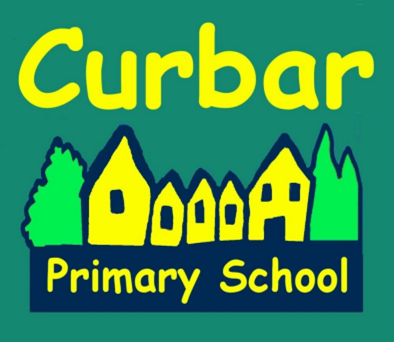Reading
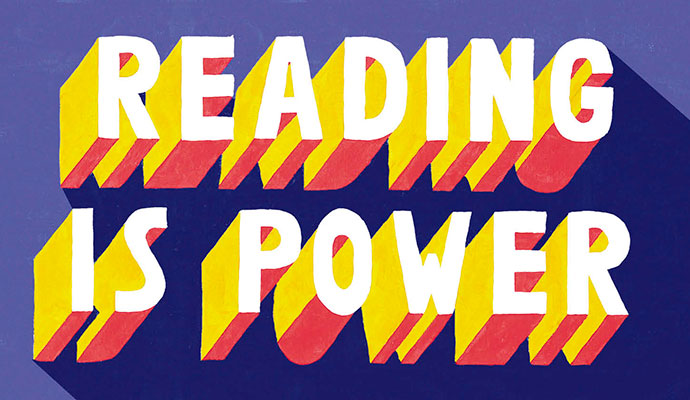
The Importance of Reading – please see the recent letter to parents about reading in school. Importance of Reading 19.9.23
A reminder about ‘Our Wonderful Library’:
Parents are invited to visit the school library with their children to enjoy the amazing books we have. You are welcome to go straight up any day after school from 3:15 – 3:30pm to choose something together. Please only choose one book per child and ensure you return any other books you have at home so other children can enjoy them. You are welcome to sit down, relax and enjoy a book in our library!
We hope that your child and family enjoy the amazing experiences that books and reading can bring.
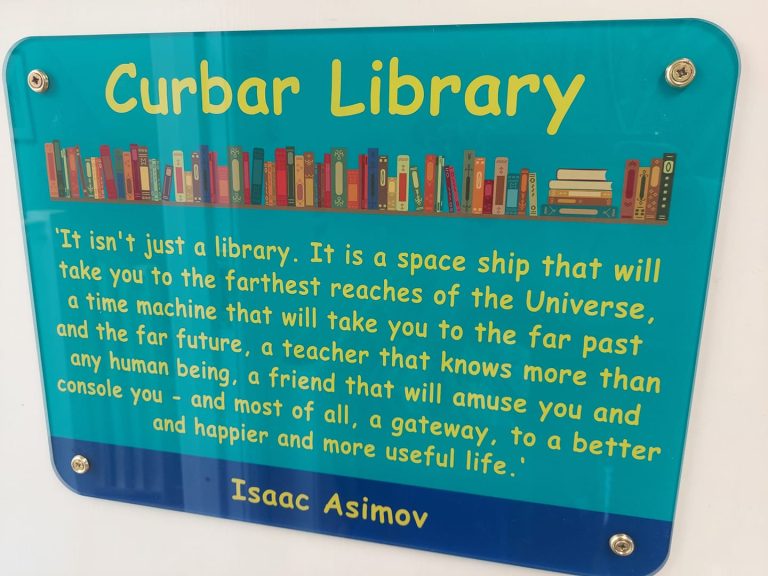
Some key dates:
Phonics and reading meeting for parents – Wednesday 18th September 2023 – 4.30pm Little Wandle and reading parent presentation-September 23
Reading Together Session – Wednesday 11 October 2023– 2:55 – 3:10pm. You are invited to come into school and share the joy of reading with your child. That’s it – that simple! These will run every month. Come on – dive into a book!
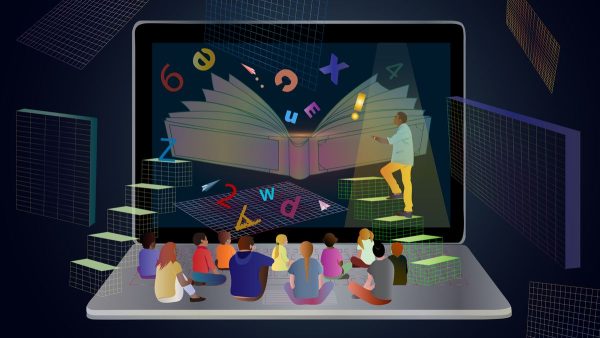
World Book Day – Thursday 2 March 2023. Please see attached letter for further information. WBD letter to parents 16.2.23
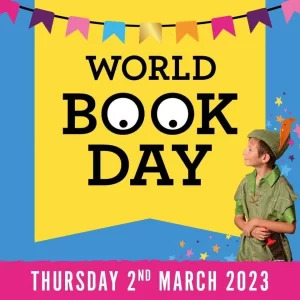
How do we teach reading?
Children begin learning to read in Reception using phonics. Please see the Early years reading page. We follow the Little Wandle phonics scheme into year 2. As children progress into key stage 2 we follow a whole school approach to the teaching of reading.
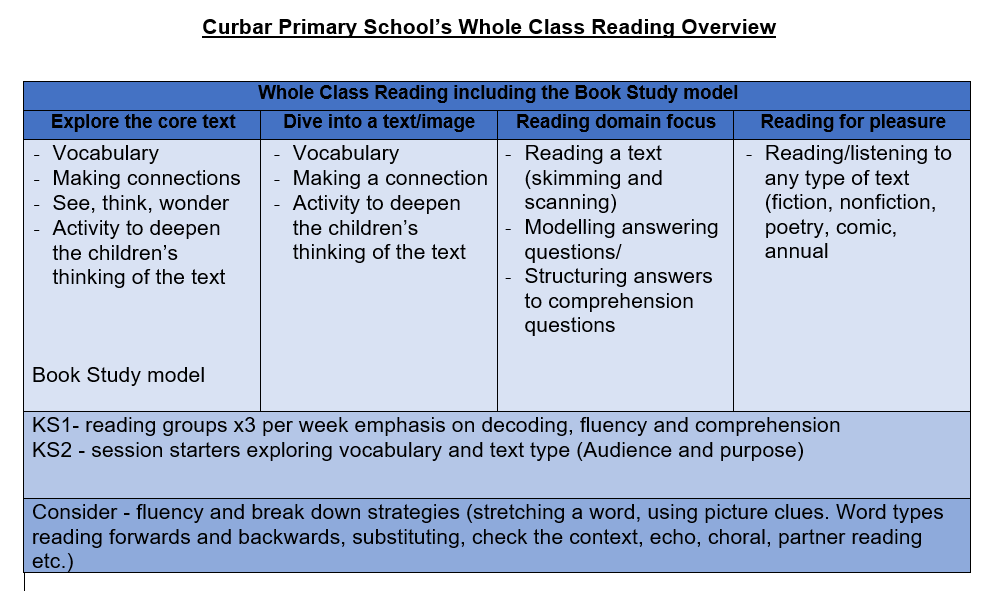
Research shows that learning to read is directly linked to children’s success at school and beyond. It also shows that those who read regularly and for longer dramatically increase the number of words they are introduced to. This in turn impacts on their success across the whole curriculum.

We believe that the relationship between school reading and home reading is vital. It is never too early to start sharing books with your child. Learning to read is about listening and understanding as well as working out print. When children hear stories, they are exposed to a rich and wide vocabulary. This helps them build their own vocabulary and improve their understanding when they listen, which is vital as they start to read. Some of the things that you can do include:
- Reading aloud to your child, talking about the words and pictures, and sharing ideas about the book.
- Reading yourself: Children who see adults reading, and enjoying reading, are much more likely to want to read themselves
- Making sure your child is surrounded by books: You don’t need hundreds of books at home and you don’t need to spend lots of money!
- Most importantly, talk to your child. Spend time with them, doing simple activities (playing, cooking, making something or playing a game). As you talk about what you’re doing, you are helping them to learn new words. Later, when they see words written down, they have already heard them and know what they mean.
How should I read to my child?
- As you read to your child, bring the characters to life – talk about the characters, the drawings and the events so that the story starts to come alive.
- Don’t be afraid to try different voices or try out your acting skills! Remember that your face says it all so exaggerate your expressions.
- Emphasise repeated words and phrases (‘I’ll huff and I’ll puff!’). Encourage your child to say the words with you.
- Turn off the television and concentrate on enjoying the book.
- Try audio books that the children can listen to in the car together on journeys, on tablets or phones.
How often should I read to my child, and how long for?
Be guided by how long your child will listen for. For younger children, this may be quite short periods of time, while slightly older children may be readier to listen for longer. Many experts suggest that a routine helps to support reading. A bedtime story can be a nice way for you to spend a small amount of time together and wind down after a busy day.
How can I choose books at the right level for my child?
At Curbar, our books are banded which grades how easy/difficult a book might be. This is particularly important when children are still learning phonics. We expect a child to read a book with about 95% accuracy if they are reading by themselves. Less than that and it’s likely that they are missing out, or misreading too many words for them to make sense of the story.
How often should I hear my child read?
We recommend that you hear your child read at least four times every week. As your child progresses in their ‘learning to read journey’ the duration of these sessions will lengthen. By the end of key stage 1 your child will be reading with more confidence and fluency. You may think that they no longer need you in their reading journey. You are still play a vital role in this process. We still endorse the importance of hearing your child read to you as they progress through key stage 2. They will still need discussions regarding the language and plot of the texts they encounter. In key stage 2 the children are encouraged to record the reading at home they do in their ‘home school learning’ logs.
What about school books?
We assign home reading books from Reception upwards. We use the Big Cat Little Wandle Letter and Sounds Revised reading books.

As children become more independent in their reading they will select their own reading books from within their current book band (also Collins Big Cat). We encourage children to select a range of genres (fiction, non-fiction, poetry, play scripts etc.) within each book band they progress through. Every child is also issued with a Home School Reading log. At Curbar, we value and expect regular home reading. We ask that children read their home reading book at least four times a week to an adult. Please sign your child’s Home Reading Record to say that he/she has read. We monitor reading records on a daily and weekly basis and ask that reading bags are brought to school every day.
Please see the parent booklet for further information: Reading at home with your child leaflet for parents 2021
Our School Library
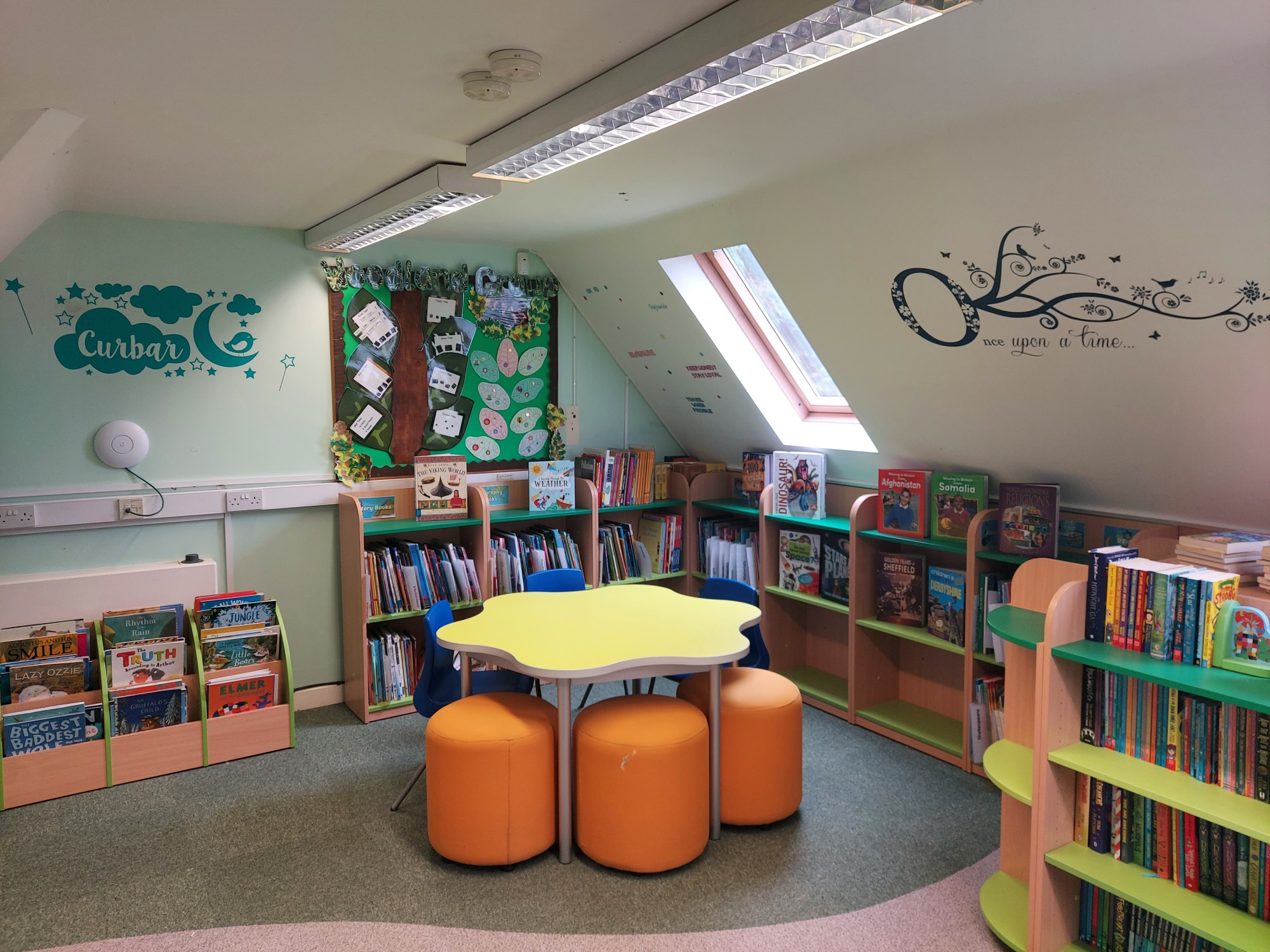
One of the reasons for a library is to engender a love of reading and for the children to pick a book that is exciting and wondrous. It might not be a book they can read but they chose it because they love the cover or the pictures or the title. They have chosen it because it is magical.
We want the children to be able to continue their love of reading and take home some of our library books. Our children visit the library at least once a week to choose a book. These will be in addition to their normal home reading books.
So if you’re child brings home a library book, please spend some time sharing the book with them! This could be reading it with them, discussing the images or just talking about it.
Parents are invited to visit the school library with their children to enjoy the amazing books we have. You are welcome to go straight up any day after school from 3:15 – 3:30pm to choose something together. Please only choose one book per child and ensure you return any other books you have at home so other children can enjoy them. You are welcome to sit down, relax and enjoy a book in our library!
We hope that your child and family enjoy the amazing experiences that books and reading can bring.

Our Reading Spine
Every half term, the class teacher shares a reading book in depth with the class during reading lessons. This is called a book study and the exciting text that has been chosen is used to learn key reading skills on top of phonetic understanding.
We have selected books from Reception to Year 6 that our children will enjoy. We call this a reading spine. Please click on the link below to see our carefully chosen books:
Curbar Primary School Book Spine – March 2022
We use an acronym called VIPERS to help us learn the key skills of reading.
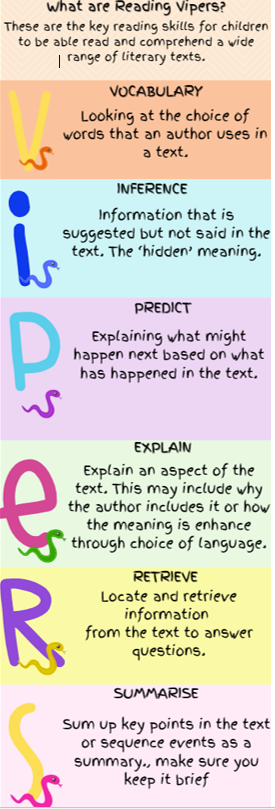
Useful Links:
Derbyshire Libraries Summer Reading Challenge
Oxford Owl Shop – For free information for parents and free E books.
Top 50 Books for Children – as recommended by Waterstones.
